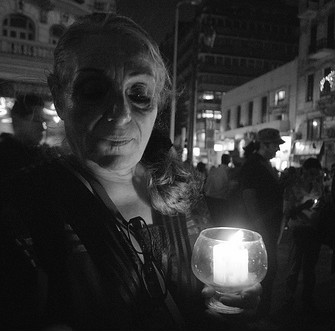Winter for Arab Christians?

The Middle East is an increasingly dangerous place for Christians. In October, Coptic Christians in Egypt were attacked by Muslims in clashes that were apparently encouraged and even carried out by the Egyptian military. The conflict left 24 people dead and over 300 wounded, raising the specter of the Arab Spring turning into a nightmarish winter for Christians.
An irony of Christian life amid the Arab Spring is that Christians have frequently been protected by the authoritarian regimes that are under attack. The overthrow of Hosni Mubarak's rule in Egypt earlier this year has left Christians more vulnerable to sectarian strife—not unlike what happened in Iraq, where the fall of Saddam Hussein led to violence and half the Christian population fled. In Syria, meanwhile, Christians fear that an overthrow of dictator Bashar al-Assad would remove the regime that has protected them.
To understand the complexities of Christian existence in the Middle East, says historian Christian Sahner, one needs to take the long view. In the time of the Ottoman Empire, which governed the eastern Mediterranean world from the late Middle Ages to the early 20th century, Christians often served as political and commercial middlemen, connecting Muslims to the West. That role gave Christians influence and access to education and wealth, which in turn fostered resentment on the part of Muslims.
In the 20th century, secular rulers often allied themselves with Christians against Muslim movements. In both Egypt and Syria, dictators have played on fears of an Islamist takeover to retain Christian support.
Finally, Sahner points out, the post-1960s collapse of nationalism in the Arab world (a nationalism often led by Christians) has by default made Islamism a potent political rallying point. And that leaves Christians in a precarious position.
Sahner thinks that the treatment of Christians will offer a clue to the direction of the Arab Spring. "Will revolutionary movements give rise to democratic governments that uphold universal equality before the law, or to unstable, mercurial regimes that obey the whims of extremists? These are the signal questions facing Christians in the Arab Spring, and as of now, the new season's forecast looks uncertain."
That uncertain future is likely to encourage more Christians to leave the region, while others hunker down and try to survive. Still others embrace the difficult work of peacemaking. Some Christian priests in Egypt have sought relationships with imams, counseled their flocks against retaliatory violence and joined moderate Muslims in seeking a democratic state that protects religious freedoms. In Lebanon, where Christians make up one-third of the population, Patriarch Bechara Rai of the Lebanese Maronite Catholic Church has called for a summit meeting of religious leaders to promote an atmosphere "where all religious communities live together in freedom and mutual respect."
Whatever success these peacemaking efforts have, Christians in the West should look for ways to support the Christians of the Middle East and at least seek to understand the volatile situations in which they live.




